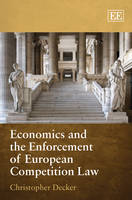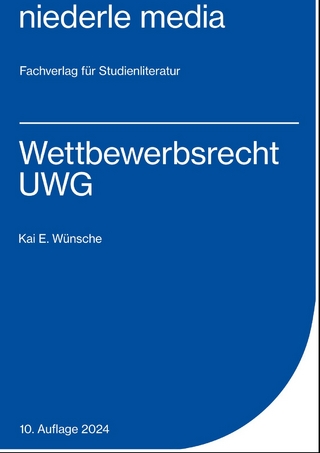
Economics and the Enforcement of European Competition Law
Seiten
2009
Edward Elgar Publishing Ltd (Verlag)
978-1-84844-307-5 (ISBN)
Edward Elgar Publishing Ltd (Verlag)
978-1-84844-307-5 (ISBN)
Recent years have seen a trend toward an `economics-based’ approach to the enforcement of European competition law. This book seeks to place in perspective the growing use of economics in European competition law enforcement by examining precisely how economics contributes to the enforcement activity of the European Commission and Courts.
Recent years have seen a trend toward an 'economics-based' approach to the enforcement of European competition law. But what is meant by 'economics-based', and how does this approach sit with legal and enforcement practice? This book seeks to place in perspective the growing use of economics in European competition law enforcement by examining precisely how economics contributes to the enforcement activity of the European Commission and Courts.Christopher Decker provides unique empirical insights as to how economic theory, thinking, techniques and data have featured in decision-making in the area of co-ordinated effects. The role of economics is examined throughout the entire enforcement process, from the decision to initiate an investigation to the design and implementation of remedies, and its conclusions are of general relevance to all areas of competition law enforcement where economics is used.
Utilising a broad and multifaceted conception of economics, this book is essential reading for academics and students interested in European competition law, EC competition lawyers, applied industrial economists and enforcement officials. It will also be an invaluable tool for academic libraries and institutes, government agencies, law firms and economic consultancies.
Recent years have seen a trend toward an 'economics-based' approach to the enforcement of European competition law. But what is meant by 'economics-based', and how does this approach sit with legal and enforcement practice? This book seeks to place in perspective the growing use of economics in European competition law enforcement by examining precisely how economics contributes to the enforcement activity of the European Commission and Courts.Christopher Decker provides unique empirical insights as to how economic theory, thinking, techniques and data have featured in decision-making in the area of co-ordinated effects. The role of economics is examined throughout the entire enforcement process, from the decision to initiate an investigation to the design and implementation of remedies, and its conclusions are of general relevance to all areas of competition law enforcement where economics is used.
Utilising a broad and multifaceted conception of economics, this book is essential reading for academics and students interested in European competition law, EC competition lawyers, applied industrial economists and enforcement officials. It will also be an invaluable tool for academic libraries and institutes, government agencies, law firms and economic consultancies.
Christopher Decker, Research Fellow in Law and Economics, CSLS, University of Oxford, UK
Contents: Preface 1. Introduction 2. The Enforcement Context 3. The Law and Economics of Tacit Coordination 4. A Review of Collective Dominance Decisions 5. Economics in the Enforcement Process 6. The Contribution of Economics to Enforcement 7. Towards a More Economic Approach Appendix: The Economics of Tacit Collusion Bibliography Index
| Erscheint lt. Verlag | 30.9.2009 |
|---|---|
| Verlagsort | Cheltenham |
| Sprache | englisch |
| Maße | 156 x 234 mm |
| Themenwelt | Recht / Steuern ► EU / Internationales Recht |
| Recht / Steuern ► Wirtschaftsrecht ► Wettbewerbsrecht | |
| Wirtschaft ► Volkswirtschaftslehre | |
| ISBN-10 | 1-84844-307-2 / 1848443072 |
| ISBN-13 | 978-1-84844-307-5 / 9781848443075 |
| Zustand | Neuware |
| Haben Sie eine Frage zum Produkt? |
Mehr entdecken
aus dem Bereich
aus dem Bereich
mit Preisangabenverordnung
Buch | Hardcover (2023)
C.H.Beck (Verlag)
139,00 €


